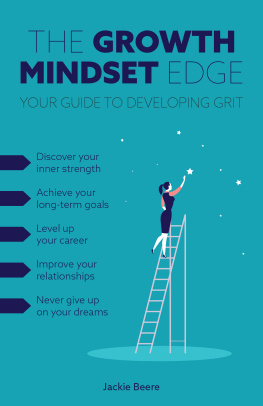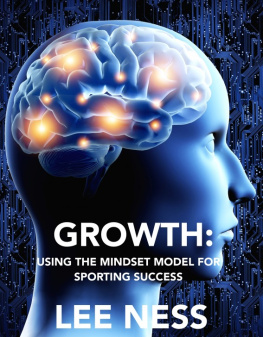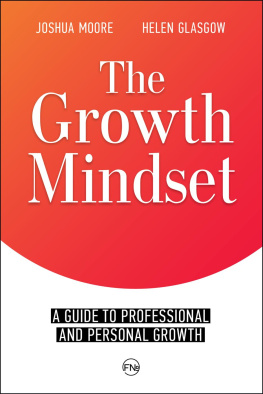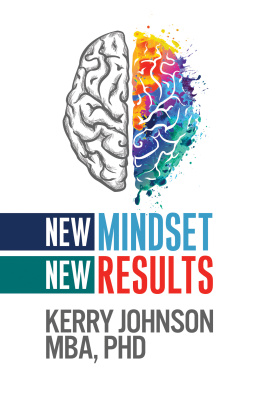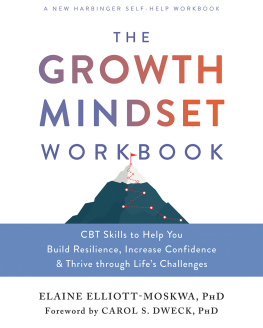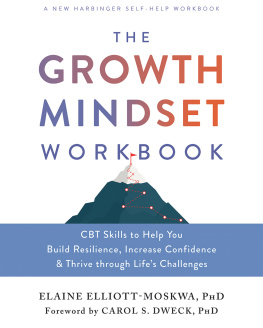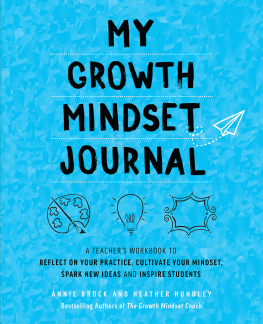
THE GROWTH MINDSET EDGE
YOUR GUIDE TO DEVELOPING GRIT
Jackie Beere
Text copyright 2016 Jackie Beere. Illustrations copyright 2016 Les Evans. All rights reserved. Any unauthorized duplication in whole or in part or dissemination of this edition by any means (including but not limited to photocopying, electronic devices, digital versions, and the internet) will be prosecuted to the fullest extent of the law.
First published as Grow: Change Your Mindset, Change Your Life in 2016 in the United Kingdom and Williston, Vermont, by Crown House Publishing
ISBN: 978-1-61243-923-5
US editors: Shayna Keyles, Renee Rutledge
Front cover design: Justin Shirley
Cover image: Katflare/shutterstock.com
Licensed for sale in the United States, Canada and Mexico only, not for export.
This book is dedicated to my dad, who loved to learn new things.
Contents
Introduction
In the 21st century, it is not the strongest people that thrive, nor the most intelligent, but those who respond best to change and choose to grow.
As a teacher, writer, trainer, mother, wife, friend, worrier and optimist, I have been on a lifelong journey of self-discovery to see how to make life work well so that I can be both happy and successful. On the way Ive experienced massive challenges and tragic events alongside unexpected achievements. My lifelong action research project has been to find out how to surviveand thrive.
Ive discovered over and over again that the key to successful living and happy relationships depends on the way you think when you react to events.
We will all experience our share of tragedy and triumphthink, for example, of Amy Winehouse and Katie Piper. Different people, different outcomes. The difference between them is in how they reacted to events. Do you turn triumph into tragedyor tragedy into triumph?
In order to move on in life, we have to adapt constantly to what happens around usand to us. Our ability to cope well in a changing world is an essential element of a happy existence. How we react to events or respond to changes, both minor and major, determines whether or not we will experience success or failure in life.
Our response to change and to events affects what happens next. And that becomes the beginning of the next stage of our journey.
From Thinking to Feeling, Then Acting
The way you think impacts the way you communicate, both internally and with others. The way you think creates habits and attitudes that influence your behavior. The way you think helps you choose to growor not.
Thoughts can make you feel happy or sad, clever or stupid, beautiful or uglydespite all the physical or other evidence to the contrary. What I call thinking on purpose is a method of helping you understand and manage your feelings; a method that grows the emotional intelligence (EQ) you need to become happier, wiser, kinder and more successful.
This book aims to share some observations, stories and practical tools to help you and others you care about grow to become more resilient and adaptable. Thinking on purpose means managing your thoughts, and therefore your feelings, effectively. This is my personal perspective, but one that is informed by wide reading and research. I have been particularly inspired by Daniel Golemans work on emotional intelligence, Carol Dwecks research on the power of developing a growth mindset, the founding principles of neuro-linguistic programming, and the latest discoveries about our brains and how they work.
The Journey into Learning
It all begins with thinking.
Our minds run a constant dialogue or commentary on the sights and sounds, highs and lows that we experience. And most of the time were not even aware of it. This inner dialogue is often forming our reactions, creating our attitudes and shaping our behaviors and we dont realize it is having this effect.
Your thoughts might flit from food to television, to animals, to work, to friends, to the weatherall in the twinkling of an eye. If you tried to stop thinking, the word stop would start a whole new set of connections. One thing is for sure: if I say, Dont think of an elephant, an elephant will be the only thing you can think of!
This means thinking on purpose can be tough because we have to learn to manage the pictures and words that create meaning for us. Creating meaning elicits a response; a response that feeds our emotions and beliefs. Thoughts really do change minds!
Understanding how we think, and acknowledging the chaos that reigns in our heads, helps us to challenge the way we sometimes think, and find out how to think on purpose in more systematic, productive ways. We can reframe how we see situations by thinking on purpose and develop a cognitive flexibility that will build our resilience and confidence.
How Do You See Learning?
For many people, the idea of learning has negative associations. It started off well as you sauntered through your babyhood and early learning journeys into walking, talking, climbing and exploring. Sooner or later, though, someone judges you, measures your progress and compares you to others. School does this constantly, with tests and exams, or even on the sports field, where you can be left feeling stupid or embarrassed when you struggle in front of your peers. It is easy to stop enjoying learning.
As an ex-teacher, I know that the school system isnt perfect in terms of teaching or developing the habits of great learning in our children. Schools are often too bound up in systems, focused on meeting national standards and measuring progress, quality control, exam results and all the rest. They often forget that the best learning comes from taking a risk and making mistakes. This can leave a legacyand for many, not a very positive one. This experience can make learning later in life more of a struggle. As they have not developed an understanding of learning, people then have to overcome the emotional barriers to learning that may have been generated at school.
Still, once you leave school, you have the chance to take charge of your own learning. You can choose to learn at work or at home by reading, taking up hobbies, learning to play sport or music or simply by watching others who are good at things. You can keep on growing new neural pathways until the day you die. Or you can choose to do none of these.
Im not a psychologist or a neuroscientist, but I am fascinated by people and how they can change. Ive been through many different kinds of training courses, and read all the latest self-help books. My bookshelves at home tell the story of each of my decades. I explored a number of personal development theories, that Ill mention throughout this book, because some have worked for me. Some may also work for you, but taming your brain will be hard work and there is no quick fix. It is more like a lifelong journey.
Where This Book Came From
As Ive said, lots of reading has informed this book, but my main inspirations have been:
Daniel Golemans work on emotional intelligence
Richard Bandler and John Grinders concept of neuro-linguistic programming (NLP), and
Carol Dwecks work on mindsets.
Emotional Intelligence
Daniel Golemans work encouraged me to consider the following as the driving forces of success:
Managing emotions. For me, this involves being able to control my instinctive emotional reaction to a situation so that I avoid acting on impulse, and being able to stand back for a few moments and take stock of a situation before I think, say or do something that is inspired by fear or anger. Losing your temperwith yourself or otherscan become an unhelpful habit. Managing your emotions so they dont control you requires thinking on purpose!
Next page
